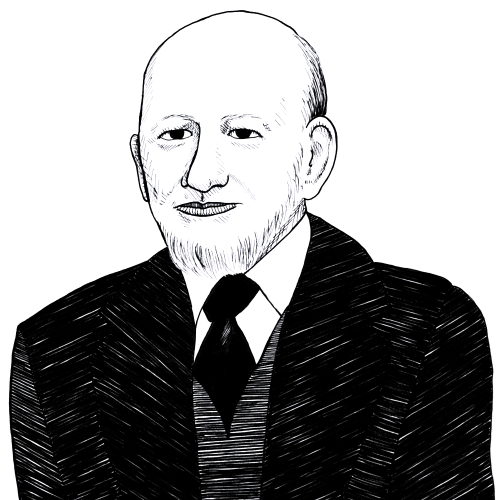Liberty Matters
Lachmann’s Legacy
 Friedrich Hayek famously said that "nobody can be a great economist who is only an economist—and I am even tempted to add that the economist who is only an economist is likely to become a nuisance if not a positive danger." Lachmann would certainly agree, and he personified that sentiment. His depth and range of matters historical, philosophical, sociological, and cultural were beyond impressive. Yet, unlike Hayek, he was never well-known, in spite of his many connections to the luminaries of the profession at the time. Some of these connections date from the LSE period when he was in a cohort with many future big names, including, most notably, John Hicks, whose work remained an inspiration to him throughout his life. (Not so well known is Lachmann's lesser but nevertheless influence on Hicks's thinking on capital.)
Friedrich Hayek famously said that "nobody can be a great economist who is only an economist—and I am even tempted to add that the economist who is only an economist is likely to become a nuisance if not a positive danger." Lachmann would certainly agree, and he personified that sentiment. His depth and range of matters historical, philosophical, sociological, and cultural were beyond impressive. Yet, unlike Hayek, he was never well-known, in spite of his many connections to the luminaries of the profession at the time. Some of these connections date from the LSE period when he was in a cohort with many future big names, including, most notably, John Hicks, whose work remained an inspiration to him throughout his life. (Not so well known is Lachmann's lesser but nevertheless influence on Hicks's thinking on capital.)After his death, Lachmann's name is perhaps no better known among economists in general than it was during his life. But his influence among Austrians is certainly strong and shows no signs of diminishing. This influence operates at both the conscious and unconscious levels. Modern Austrian economists unconsciously accept certain Lachmannian presumptions, and others very deliberately try to apply his insights. So much is indicated by the contributions to this discussion from the methodology of intersubjective understanding and interpretation: from Eichholz -- who helpfully and expertly places it in historical and conceptual context following Lewis's explanation of how the notion of verstehen was broadened by Lavoie and led to a particular understanding of what constitutes "normal science" in Austrian economics -- to Rizzo's extensive, often very specific applications of Lachmann's open-ended universe within evolving legal and other institutions, to the (so far the least-developed) implications of his capital-theory in the field of information technology (Tulloh).
Related to the last mentioned, noted by Lewis, is the discovery of Lachmann by scholars in the field of management studies. Some years ago the management field embraced the insights of Israel Kirzner on entrepreneurship in a rather curious way. While enthusiastic about the prominence that Kirzner bestowed upon the entrepreneur as the "discoverer" of opportunities for innovation and profit (see Shane 2000, 2008 and Shane and Venkataraman 2000), they gradually became aware that Kirzner's entrepreneur was a rather limited and ephemeral figure. In fact, much work citing Kirzner used a notion of the entrepreneur which Kirzner himself (in his inevitably amiable way) disavowed. His entrepreneur was not a business manager or financier, he was rather an alert character who perceived an arbitrage opportunity that was hitherto unnoticed. Once noticed, the entrepreneurial function was over. This was "pure entrepreneurship."
By contrast, Lachmann's entrepreneur, in his capital theory and in his "market as an economic process" work, was a real-life human being (a "real type"?) who was responsible for not only "seeing" an opportunity but also for putting together and managing the necessary (heterogeneous) resource combinations to bring the opportunity to fruition in the form of profits. In doing so he necessarily exercised his capacities for judgment and estimation (calculation). This is most fully spelled out in Lachmann (1986) where he investigates knowledge, expectations, calculation, and related themes in different types of markets and situations.
So it is not surprising that, in a way extending from their examination of Kirzner, management scholars in turn discovered Lachmann and found his views much more congenial to understanding management in the dynamic world they sought to investigate. Some Austrians (notably Klein 2008, and Foss and Klein 2012) were also involved in this. Perhaps the most illuminating starting point into this literature is the article by Richard Langlois (2013). See also the reference in Lewin 2015.
How far one can go with this remains to be seen. Lachmann, more than anyone, would affirm the conclusion that when it comes to entrepreneurship in an uncertain world, there are no formulas for success, no silver bullets. But there are in his work many interesting insights that may be of help to the scholar and practitioner in understanding her environment.
Copyright and Fair Use Statement
“Liberty Matters” is the copyright of Liberty Fund, Inc. This material is put on line to further the educational goals of Liberty Fund, Inc. These essays and responses may be quoted and otherwise used under “fair use” provisions for educational and academic purposes. To reprint these essays in course booklets requires the prior permission of Liberty Fund, Inc. Please contact oll@libertyfund.org if you have any questions.